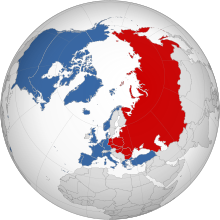Non-Aligned Movement
[10] The purpose of the organization was summarized by Fidel Castro in his Havana Declaration of 1979 as to ensure "the national independence, sovereignty, territorial integrity and security of non-aligned countries" in their "struggle against imperialism, colonialism, neo-colonialism, racism, and all forms of foreign aggression, occupation, domination, interference or hegemony as well as against great power and bloc politics.[13] The Non-Aligned Movement gained the most traction in the 1950s and early 1960s, when the international policy of non-alignment achieved major successes in decolonization, disarmament, opposition to racism and opposition to apartheid in South Africa, and persisted throughout the entire Cold War, despite several conflicts between members, and despite some members developing closer ties with either the Soviet Union, China, or the United States.One of the quotations within the Declaration is "Peace can not be achieved with separation, but with the aspiration towards collective security in global terms and expansion of freedom, as well as terminating the domination of one country over another".According to Rejaul Karim Laskar, an ideologue of the Congress party which ruled India for most part of the Cold War years, the Non-Aligned Movement arose from the desire of Jawaharlal Nehru and other leaders of the newly independent countries of the third world to guard their independence and sovereignty "in face of complex international situation demanding allegiance to either two warring superpowers".Bringing together Sukarno, U Nu, Nasser, Nehru, Tito, Nkrumah and Menon with the likes of Ho Chi Minh, Zhou Enlai, and Norodom Sihanouk, as well as U Thant and a young Indira Gandhi, the conference adopted a "declaration on promotion of world peace and cooperation", which included Zhou Enlai and Nehru's five principles, and a collective pledge to remain neutral in the Cold War.Six years after Bandung, an initiative of Yugoslav president Josip Broz Tito led to the first Conference of Heads of State or Government of Non-Aligned Countries, which was held in September 1961 in Belgrade.[18] At the Lusaka Conference in September 1970, the member nations added as aims of the movement the peaceful resolution of disputes and the abstention from the big power military alliances and pacts.The 1976 world conference of the Non-Aligned Movement applauded Cuban internationalism, "which assisted the people of Angola in frustrating the expansionist and colonialist strategy of South Africa's racist regime and its allies."[22][23][24] The various successor states of Yugoslavia have expressed little interest in membership, though all of them but Slovenia, North Macedonia and Kosovo (i.e. Bosnia and Herzegovina, Croatia, Montenegro and Serbia) retain observer status.A major question has been whether any of its foundational ideologies, principally national independence, territorial integrity, and the struggle against colonialism and imperialism, apply to contemporary issues.The movement has emphasised its principles of multilateralism, equality, and mutual non-aggression in attempting to become a stronger voice for the Global South, and an instrument that can promote the needs of member-nations at the international level and strengthen their political leverage when negotiating with developed nations.[26] However, as in the past, cohesion remains a problem, since the size of the organisation and the divergence of agendas and allegiances present the ongoing potential for fragmentation.While agreement on basic principles has been smooth, taking definitive action vis-à-vis particular international issues has been rare, with the movement preferring to assert its criticism or support rather than to pass hard-line resolutions.It opposes foreign occupation, interference in internal affairs and aggressive unilateral measures, but it has also shifted to focus on the socio-economic challenges facing member states, especially the inequalities manifested by globalization and the implications of neo-liberal policies.[29] Attendance at the highest level included 27 presidents, two kings and emirs, seven prime ministers, nine vice-presidents, two parliamentary spokesmen and five special envoys.The current requirements are that the candidate country has displayed practices in accordance with the ten "Bandung principles" of 1955:[35] Chairpersons[36] of the NAM have included such diverse figures as Suharto,[37] a militaristic[38] anti-communist, and Nelson Mandela, a democratic socialist and famous anti-apartheid activist.The Brioni meeting between heads of governments of India, Egypt and Yugoslavia in 1956 recognized that there exists a vital link between struggle for peace and endeavours for disarmament.Both organisations have a stated policy of peaceful cooperation, yet the successes the NAM has had with multilateral agreements tend to be ignored by the larger, western- and developed- nation-dominated UN.Issues such as globalization, the debt burden, unfair trade practices, the decline in foreign aid, donor conditionality, and the lack of democracy in international financial decision-making are cited as factors inhibiting development.Examples include Workshop on IUU fishing eradication,[57] dispatch of agricultural experts to Myanmar[58] and international tissue culture training.[63][citation needed] In line with its views on sovereignty, the organisation appeals for the protection of cultural diversity, and the tolerance of the religious, socio-cultural, and historical particularities that define human rights in a specific region.





United Nations HeadquartersNew York CityUgandaYoweri MuseveniPresident of UgandaBelgradeYugoslaviaConference of Heads of State or Government of Non-Aligned Countriesare not formally alignedpower blocCold WarUnited NationsKorean WarpolarizationsocialistWarsaw PactcapitalistBandung ConferenceJosip Broz TitoJawaharlal NehruGamal Abdel NasserKwame NkrumahSukarnofirst Conference of Heads of State or Governments of Non-Aligned CountriesFidel Castroimperialismcolonialismneo-colonialismracismoccupationhegemonygreat powerdeveloping countriesdeveloped nationsdecolonizationdisarmamentopposition to racismapartheid in South AfricaCold War's end in 1991Global SouthBrioni MeetingBrijuniRejaul Karim LaskarCongress partydeveloping worldWesternEastern BlocsV. K. Krishna MenonFive Principles of Peaceful CoexistenceSino-Indian relationsterritorial integritysovereigntyHo Chi MinhZhou EnlaiNorodom SihanoukU ThantIndira GandhiLusakamilitary basesUnited Nations General AssemblyResolution 3379Arab countriesSoviet blocApartheidIndia and PakistanIran and Iraq1976 world conference of the Non-Aligned Movementnext Non-Aligned conferenceintervened in Afghanistan's civil warpredominantly Muslim statesIlham AliyevNicolas Maduro18th Summit of the Non-Aligned Movementbreakup of YugoslaviaNew YorkGeneral Assembly of the United NationsSloveniaNorth MacedoniaKosovoBosnia and HerzegovinaCroatiaMontenegroSerbiadowngraded its emphasisCosta RicaCyprusEuropean UnionAzerbaijanBelarusworld-systemglobalizationneo-liberal policiesunderdevelopmentpoverty16th NAM summitTehranMehr News Agency18th NAM summit19th NAM summitCharter of the United NationsSuhartoanti-communistNelson Mandelademocratic socialistanti-apartheidworld peaceinstitutionalisationBrioniNew International Economic OrderNew World Information and Communication OrderNon-Aligned News Agencies PoolNAM News Networkconcerns about PalestineideologicalRhodesiareforming of the United Nations Security CouncilUN reformsUN Security CouncilPuerto Rico's self-determinationHostosian National Independence MovementWestern Sahara's self-determinationSahrawi peoplesustainable developmentMillennium Development Goalsdebt burdenunfair trade practices